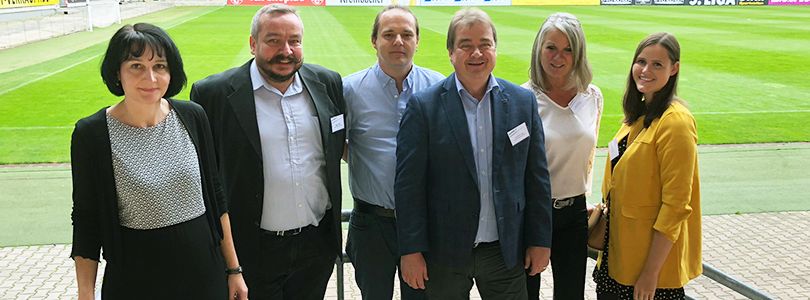Content
140 years of the patent and information centre Rhineland-Palatinate

The team of the patent and information centre Rhineland-Palatinate in the Fritz Walter stadium in Kaiserslautern with Jan-Ulrich Glup (fourth from the left)

„The patent and information centre Rhineland-Palatinate has been located at the Technical University of Kaiserslautern (TUK) since 1979 and is currently a division of the Technology and Innovation Office. In 1999, the patent and information centre became a receiving unit for patent and utility model applications, and since 2005 it has been an official cooperation partner of the German Patent and Trade Mark Office.“
DPMA:The Kaiserslautern patent and information centre (PIZ) is 140 years old this November. This probably makes it one of the oldest patent information centres in Germany.
Jan-Ulrich Glup (JUG):In 1881, the patent information centre (then called Patentauslegestelle) was established in the then Palatine state museum of industry (Landesgewerbemuseum der Pfalz) in Kaiserslautern. That was only four years after the entry into force of the new Imperial Patent Act (Reichspatentgesetz) in 1877 and the foundation of the Imperial Patent Office (Kaiserliches Patentamt) in the same year. This makes the PIZ indeed one of the oldest patent information centres in Germany.
Since 1979, the patent and information centre (PIZ) Rhineland-Palatinate– as it is officially called today – has been located at the Technical University of Kaiserslautern (TUK) and is currently a division of the Technology and Innovation Office. In 1999, the patent and information centre became a receiving office for patent and utility model applications, and since 2005 it has been an official cooperation partner of the German Patent and Trade Mark Office.
DPMA:Inventions such as letterpress printing, the folding rule or the “Geiger counter” originated in Rhineland-Palatinate. So what about today’s innovative strength?
JUG:![]() Deutscher Zukunftspreis 2021 award
Deutscher Zukunftspreis 2021 award
Many significant technical and social achievements worldwide had their origin in Rhineland-Palatinate. From the synthetic production of indigo (1897) to the invention of expanded polystyrene foam and the world-famous CERAN. Probably the best-known and highly topical invention from Rhineland-Palatinate is the vaccine against COVID-19, developed by BioNTech SE in Mainz, which has been nominated for the ![]() Deutscher Zukunftspreis 2021 award. You can admire numerous inventions from Rhineland-Palatinate at the
Deutscher Zukunftspreis 2021 award. You can admire numerous inventions from Rhineland-Palatinate at the ![]() permanent exhibition “Erfinderland Rheinland-Pfalz” (Rhineland-Palatinate – Land of Inventors) at the museum of technology in Speyer, set up by the ZIRP network (Zukunftsinitiative Rheinland-Pfalz) with the support of the PIZ in 2017.
permanent exhibition “Erfinderland Rheinland-Pfalz” (Rhineland-Palatinate – Land of Inventors) at the museum of technology in Speyer, set up by the ZIRP network (Zukunftsinitiative Rheinland-Pfalz) with the support of the PIZ in 2017.
In 2020, Rhineland-Palatinate ranked eighth in terms of patent applications by German Länder. The top fields of technology were “transport”, “civil engineering” and “electrical machinery, apparatus, energy”. Regrettably, the figures obtained do not really allow us to draw any further conclusions about the innovativeness of the people of Rhineland-Palatinate, because although many resident companies operate their development centres and research centres in Rhineland-Palatinate, their patent applications are filed via the respective company’s headquarters.
DPMA:What services does your PIZ offer? Who comes to you for advice?
JUG:As the official and only cooperation partner of the DPMA in Rhineland-Palatinate, the patent and information centre Rhineland-Palatinate offers a wide range of services in the field of industrial property protection. This ranges from seminars and workshops to IP searches and monitoring services for all types of IP rights. The services of the PIZ also include monthly consultations for first-time inventors held by patent attorneys and the receipt of IP applications.
Furthermore, the office of the patent association for research in Rhineland-Palatinate (Patentverbund Forschung Rheinland-Pfalz) has been located at the PIZ since 2016. Due to its close proximity to the Technical University of Kaiserslautern, many scientists and students are among the clientele of the PIZ.
The main customer group is clearly composed of small and medium-sized enterprises from all over Rhineland-Palatinate. These companies usually do not have their own patent departments. We are also the first point of contact for all independent inventors in the Land. Patent attorneys also use our search services.
In addition, we support all start-ups at the Technical University of Kaiserslautern and the University of Applied Sciences Kaiserslautern and the local institutes, such as the German Research Center for Artificial Intelligence, the Leibniz Institute for Composite Materials and the Fraunhofer institutes. Thanks to our close cooperation with the entrepreneur centres and start-up offices in Rhineland-Palatinate, as well as our close contacts with all chambers of industry and commerce and chambers of crafts in the Land, potential start-ups receive early information and support on all issues relating to IP protection.
We also help to search for old patent specifications and trade marks and have been able to assist in exhibitions at some museums and provide historically relevant sources from patent and trade mark literature in recent years.
DPMA:How has the coronavirus pandemic changed your services?
JUG:The coronavirus pandemic has confronted the DPMA, like all employers worldwide, with new challenges. As early as mid-February 2020, the first coronavirus case occurred at the Technical University of Kaiserslautern (TUK). Measures were immediately planned and initiated in order to protect the employees and customers of the patent and information centre Rhineland-Palatinate. As a result, even before the first lockdown, we were able to provide the entire PIZ team with home office equipment and offer our digital information services immediately. This enabled us to hold encrypted video conferences on the university's own servers in a timely manner and in compliance with data protection regulations. Moreover, the free monthly consultations for first-time inventors held by a patent attorney were provided by telephone and via video conference.
Of course, our usual face-to-face workshops and seminars have also been converted to digital formats. We conducted, among other things, online-only workshops as part of the German Entrepreneurship Week, the World Intellectual Property Day and the “IP strategies for SMEs” consulting week.
However, unfortunately, it also became apparent that especially older people seeking advice were overwhelmed by the digital formats on offer or, in many cases, they simply did not have the technical prerequisites, so face-to-face on-site information would have been desirable. The pandemic also showed us that we were able to perform many of the tasks involved fully electronically by working from home, whereas the receipt of IP applications, for example, requires on-site presence.
DPMA:Most patent applications are filed by men. What could be the reason for that? Do you offer training or advice for women and girls?
JUG:The inequality between female and male inventors in science at the TUK can be traced back to the unequal distribution in the departments relevant to inventions. As a consequence, through STEM camps, Girls' Day and participation in the Land-wide ![]() Ada Lovelace project, the TUK has been trying for years to spark more interest in the invention-relevant technical and scientific subjects. However, the gender imbalance in these fields still remains. At the TUK, for example, the proportion of female scientific employees in 2020 was below 20% in the Department of Mechanical and Process Engineering as well as in the Department of Physics, and as low as 11.2% in the Department of Electrical and Computer Engineering. The proportion of invention disclosures filed by female scientists is accordingly small.
Ada Lovelace project, the TUK has been trying for years to spark more interest in the invention-relevant technical and scientific subjects. However, the gender imbalance in these fields still remains. At the TUK, for example, the proportion of female scientific employees in 2020 was below 20% in the Department of Mechanical and Process Engineering as well as in the Department of Physics, and as low as 11.2% in the Department of Electrical and Computer Engineering. The proportion of invention disclosures filed by female scientists is accordingly small.
The PIZ is trying to counteract this development using two measures: I have been a member of the vocational training committee of the Chamber of Industry and Commerce for the Palatinate for more than 20 years; through contact with the vocational schools in Kaiserslautern, school girls of the higher years are invited twice a year to awareness-raising measures in the field of IP protection.
The PIZ, through the Technology and Innovation Office, with the Science and Innovation Alliance Kaiserslautern e.V. (SIAK), is participating in a project application for the BMBF line of funding ![]() "MissionMINT – Frauen gestalten Zukunft" (STEMproject – Women shape the future). Within this framework, projects are promoted with the topic of increasing the proportion of women in the STEM research and innovation process by strengthening self-efficacy, initiative and creativity. The project application aims at increasing the proportion of women in STEM subjects, STEM specialist and management positions as well as in start-ups and patent applications in the Kaiserslautern region. To this end, within the framework of the planned project, the SIAK is initiating various innovative measures to strengthen networking, exchange and self-efficacy and to empower women. If the project is approved, the PIZ will offer a tailored training programme in the area of IP rights.
"MissionMINT – Frauen gestalten Zukunft" (STEMproject – Women shape the future). Within this framework, projects are promoted with the topic of increasing the proportion of women in the STEM research and innovation process by strengthening self-efficacy, initiative and creativity. The project application aims at increasing the proportion of women in STEM subjects, STEM specialist and management positions as well as in start-ups and patent applications in the Kaiserslautern region. To this end, within the framework of the planned project, the SIAK is initiating various innovative measures to strengthen networking, exchange and self-efficacy and to empower women. If the project is approved, the PIZ will offer a tailored training programme in the area of IP rights.
DPMA:What are your plans for the next few years?
JUG:For the next few years, we have the following primary items on our agenda:
- Continuous expansion of our online services
- Expansion of the network with schools and training centres in order to make people, in particular potential inventors, aware of IP rights at an earlier stage
- In our function as office of the patent association for research in Rhineland-Palatinate (Patentverbund Forschung Rheinland-Pfalz): regular on-site attendance training courses at the universities and research institutions of the Land in order to implement the Employee Inventions Act (Arbeitnehmererfindungsgesetz)
- Internal training, mainly in the areas of copyright/software protection
DPMA:Mr Glup, thank you for the interview.
JUG:You are welcome.
Last updated: 19 November 2021

Social Media